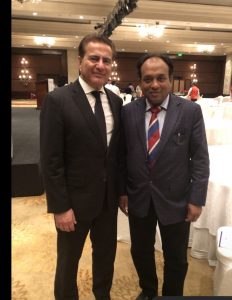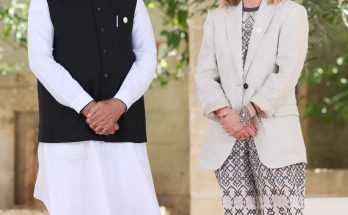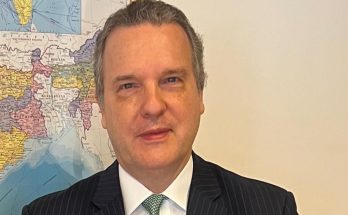
In an interview with India and World magazine, Dr Mukesh Aghi, President and Chief Executive Officer of the US-India Strategic Partnership Forum (USISPF), shared his views on President Donald Trump’s recent visit to India and the burgeoning ties between the two strategic partners.
Dr Aghi, who has worked extensively with business and government leaders in both the US and India to promote bilateral ties, underlined that President Trump’s visit resulted in significant strategic and material outcomes that will deepen economic partnership between the two democracies in months to come. In a wide-ranging conversation with Manish Chand, Editor-in-Chief, India and World and India Writes Network, Dr Aghi underscored that a strong India, in Trump’s view, is good for regional stability and balance.
(Excerpts from the interview).
Q) The 36-hour visit by Donald Trump to India scored high on spectacle as well as substance. What is the major takeaway from the first visit by Mr Trump to India?
A) You have to look at it from two broad perspectives: transactional and strategic. Strategically, the visit showed that India has a strong and growing partnership with the US. The visit highlighted that India will play a much stronger role in the Indo-Pacific region and that India and the US believes in the international rule of law. Transactionally, the two sides announced the defence deal, the energy deal, a few other deals. The visit, in short, worked well for both sides.

Q) Some critics say that this visit was more about spectacle than substance. Where does the substance lie?
A) The substance lies in the messaging. For the president of the US to say, “Modi is my dear friend,” is significant. It means that it is not just a strategic partnership; it is now a strategic friendship. President Trump talked about the value system the two countries have, and about the leadership of Swami Vivekanand and Mahatma Gandhi. The visit brought out vividly that both countries have the same values, culture, and aspirations. By any reckoning, it was a very substantive visit.
Q) During President Trump’s visit, India and the United States elevated their relations to the level of Comprehensive Global Strategic Partnership. In your opinion, what would this upgrade mean when we translate it into practical outcomes?
A) In practical terms, it would mean working together to maintain international rule of law, fighting global terrorism money laundering and other global challenges. It also means working together on strategic and geopolitical issues like how do we work on the US withdrawal from Afghanistan. The visit also highlighted India’s role as a regional leader and providing regional security and stability.
Q) In his Ahmedabad speech, President Trump lavishly praised India and Prime Minister Modi. How do you see President Trump’s commitment to India’s rise as a major power?
A) For President Trump, a militarily strong India is good for regional stability. A militarily strong India can play a leadership role across the Asia-Pacific region. A strong India, in Trump’s view, can also become a counterbalance to the aggressive posture of China.
Q) In the geopolitical context, the United States has been trying to prop up India as a sort of counterweight against an assertive and expansive China. Do you think this visit and the talks in Delhi have reinforced this trend?

A) Firstly, I don’t think India is getting propped up by the US. You have to understand that China will never treat India as an equal partner. China will treat India just like the US treats Mexico. And so, India needs some kind of partnership for its growth and for its glory. And in this regard, the United States is a natural partner. India needs the US from an economic perspective, technology perspective, and investment perspective.
Q) In transactional terms, some say that the US got more from India than India got from the US. The US got defence deals and energy deals. In concrete terms, what did India get out of it?
A) I don’t think the US got more from us. That is not the proper way to describe it. India needs high-end defence equipment to protect its national security. If India doesn’t buy from the US, it will buy from some other country. The defence deals benefit India as India is getting access to the most advanced technologies. If you look at energy deals, India was buying energy from Venezuela and Iran. India shifted to the US just to diversify energy exports and to enhance its energy security.
Q) President Trump’s visit to India was spectacular, in terms of pomp and ceremony and optics. Do you think this has raised the level of awareness about India or made the American elite more amenable to understanding India and its aspirations?
A) Yes, it has worked. It has raised more awareness on both sides that there is a need for a stronger partnership between the two countries.
Q) As an advocacy group, where do you see the India-US partnership going? In the near future, where can we see action?
A) I think you will see much more action on energy security. As India’s economic rise happens, it will need more energy. Today, India imports 80% of its energy. The US now has an abundance of that. You will see more collaboration between India and the US in the area of energy. We will also see more cooperation on cybersecurity, 5G, and terrorism. We will see more cooperation and coordination on regional and global issues.
(This interview has been published in the latest edition of India and World, a pioneering magazine focused on international affairs. To subscribe, write to: editor@indiawrites.org)

Author Profile
- India Writes Network (www.indiawrites.org) is an emerging think tank and a media-publishing company focused on international affairs & the India Story. Centre for Global India Insights is the research arm of India Writes Network. To subscribe to India and the World, write to editor@indiawrites.org. A venture of TGII Media Private Limited, a leading media, publishing and consultancy company, IWN has carved a niche for balanced and exhaustive reporting and analysis of international affairs. Eminent personalities, politicians, diplomats, authors, strategy gurus and news-makers have contributed to India Writes Network, as also “India and the World,” a magazine focused on global affairs.
Latest entries
 In ConversationJuly 26, 2024India-Italy defence collaboration can extend to third countries: Anil Wadhwa
In ConversationJuly 26, 2024India-Italy defence collaboration can extend to third countries: Anil Wadhwa In ConversationJuly 23, 2024Italy views India as a key partner in Indo-Pacific: Vani Rao
In ConversationJuly 23, 2024Italy views India as a key partner in Indo-Pacific: Vani Rao DiplomacyJune 29, 2024First BRICS unveils a roadmap for boosting tourism among emerging economies
DiplomacyJune 29, 2024First BRICS unveils a roadmap for boosting tourism among emerging economies India and the WorldJune 11, 2024On Day 1, Jaishankar focuses on resolving standoff with China
India and the WorldJune 11, 2024On Day 1, Jaishankar focuses on resolving standoff with China






